Information about the Temple of Compassion ashram, inspirational stories of compassion, and thought provoking lessons on how to live a more compassionate life.
Caring for Self
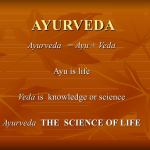
Article 1: Ayurveda by Heidi Nordlund
Focus on Women’s Issues
This article focuses on women’s issues to include Ayurvedic advice for menopausal conditions; and something helpful to men too… Read More

Article 2: Caring for Ourselves by Erin Jay
Loving Ourselves: The Magic and Importance of Self Compassion
Kriyavan Erin Jay shares her personal experience and thoughts on the divine, transformational power of self compassion, including 7 ways to practice this in our daily lives. … Read More
Caring for Community

Article 3: A Retrospective by Leslie Schaefer
Texas Silent Retreat 2016
Reflections and photos from the first ever retreat at the Temple of Compassion… Read More
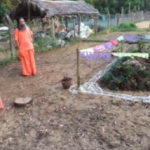
Article 4: Postcard from India by Erin Jay
Hariharananda Gurukulum in Balighai, Odisha: 7th Brahmachari Training
Our newsletter’s first foreign correspondent Erin Jay shares insights from the 7th Annual Kriya Residential Brahmachari Training Course at Hariharananda Gurukulum in Balighai, Odisha, India. … Read More
Caring for the World

Article 5: Let Your Compassion Bloom
One World Projects
The holiday season is upon us. It’s a time of good cheer, gathering with friends, forgiving differences, sharing food and drink, caroling, twinkling lights … Read More
Slideshow: Compassionate Quotes
Article 1: Caring for Ourselves: Ayurveda
 Ayurveda for Stress, Insomnia & Weight Gain*
Ayurveda for Stress, Insomnia & Weight Gain*
During autumn and early winter it is common to experience stress to a greater degree. Symptoms such as difficulty sleeping, waking up at night and feeling anxious are more prominent. Ayurveda explains why and how to correct the imbalances that lead to these symptoms. In this article, several recommendations are given to help you sleep better at night, experience greater peace, lose weight and feel balanced as you enter the New Year.
First let’s take a look at what causes the imbalances. Your body consists of five elements (ether/space, air, fire, water, earth) each corresponding to the five lower chakras. These elements combine to make up the three doshas (Vata, Pitta and Kapha). Everyone is made up of a combination of all three doshas. The doshas are responsible for the physical and emotional tendencies in your mind and body. If too much ether and air are present within, you will experience Vata imbalance, if you have too much fire, you will experience Pitta imbalance, and if you have too much water and earth you will suffer from Kapha imbalance.
Here are some common symptoms of the imbalances caused by the different doshas:
Vata
- Dry hair and skin
- Constipation
- Heart palpatations and racing pulse
- Insomnia – waking up between 3-5 am
- Joint pain that moves around from joint to joint
- Low backache
- Menstrual cramps before bleeding
- Anxiety and excessive worrying
- Lack of concentration
- Restlessness
- Fear
- Confusion
- Mood swings
Pita
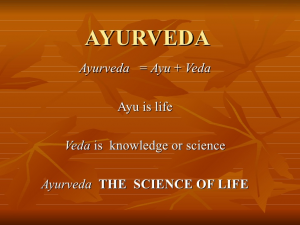 Excessive sweating – inability to adjust to warm temperatures
Excessive sweating – inability to adjust to warm temperatures- Excessive hunger
- Acidity – heartburn and hyperacidity
- Inflammation in body or joints
- Loose stools
- Insomnia – waking up between 12-3 am
- Menstrual cramps during bleeding
- Excessive irritability and anger
- Impatience
- Excessive perfectionist tendencies
Kapha
- Weight gain
- Sluggishness – feeling of heaviness and lethargy
- Edema in joints (esp. in the ankles)
- Lack of motivation
- Congestion and excess mucus
An important principle in Ayurveda is ‘like increases like’. The properties of Vata dosha are dry, cold, rough and movable and the fall and early winter seasons increase the Vata within your body and mind because it is dry, cold, rough, windy (movable) at this time of year. When your environment is presenting you with qualities that are Vata, it will enhance the Vata within you. Therefore it is common to experience Vata imbalances at this time of year.
Vata dosha rules over your nervous system and mind, and when the qualities of Vata increase, you experience more restlessness, racing thoughts and irregularity. If you are older than 50 years of age, you are in your Vata time of life and are therefore more likely to experience the imbalance of Vata. However, no matter your age, it is important to emphasize a Vata calming lifestyle at this time of year. Therefore, do your best to incorporate as many of the following recommendations into your daily life as possible. There are several things you can do in your daily activities to be well rested and happy. A calm balanced nervous system is key to having restful sleep and balanced emotions. Even small changes make a big improvement; do not feel that you need to incorporate every step.
Suggestions to Relieve Stress, Calm Your Nerves & Improve Sleep
- Stick to a regular daily schedule (as much as possible). Try to go to bed, wake up, and eat meals at the same time each day. Keeping to a schedule is a powerful way to re-set your sleep cycle for a good night’s rest.
- This is an important component for healthy sleep. Practice frequent and consistent workouts according to your fitness level and interests.
- Daily self-massage with warm oil. Oil massage is very soothing and will help you overcome anxiety and stress. For severe insomnia, do the massage at night before getting into bed. Keep a bottle of sesame, sunflower, olive, almond or coconut oil in the bathroom and apply oil to the whole body BEFORE taking a shower or a bath. This simple oil application nourishes your body, benefits your skin, produces softness, decreases the effects of aging, increases circulation and stimulates the internal organs of your body.
- Take a warm bath. After applying oil to the whole body externally, take a warm bath with 2-3 cups of sea or Epsom salt and soak for 10-20 minutes while breathing long and deep to release stress and emotional turmoil.
- Diet is an important component to calm your nervous system. Choose foods that are warm such as soups, stews, stir-fries and baked or steamed vegetables. Select ripe, sweet fruits. Enjoy hearty sauces (unless overweight) and healthy heavy foods such as dairy (unless lactose intolerant), nuts, seeds, grains, adequate oils and grounding vegetables (carrots, yams, beets, parsnips, pumpkins, winter squashes). Season the meals with lots of culinary spices such as ginger, turmeric, mustard, cumin, coriander, fennel, turmeric, basil, rosemary, nutmeg, cardamom, cinnamon, clove and garlic. (Yogis typically avoid garlic because it is stimulating but garlic does have potent medicinal values.) Avoid light, dry, crunchy, cold and old foods.
- Eat a lighter meal for dinner several hours before Lunch is the ideal time for your biggest meal of the day! Sleep can be difficult or uncomfortable with a belly full of heavy food. And if you eat too close to bedtime the food will not digest properly.
- Avoid drinking stimulants like caffeine. Caffeine robs your body of energy and is a major cause of insomnia.
- Engage in peaceful, relaxing activities in the evening after eating. Avoid loud and jarring music, violent or high-action television, video games and working on the computer, especially late at night. Instead create an evening ritual for yourself that is soothing; listen to soothing music, prepare a list of things you will do the following morning (to get them out of your head while you sleep), read a spiritual book, write in a journal and reflect.
- Meditate. Meditation allows your mind to settle; producing relaxation and increased mental peace. By calming the mind, meditation reduces insomnia.
- Drink a cup of warm milk (cow, goat or almond) or chamomile tea before bed. Add a pinch of cardamom and nutmeg to induce sleep. Ghee and raw honey also have a relaxing effect and will make the tea or milk taste even more delicious.
- Get to bed by 10 PM. This will help you get into alignment with nature’s rhythms. Turn off the TV or computer at least 30 minutes before bed. Avoid watching TV, playing on the computer, or working in your bed room.
- Massage feet with warm oil before bed. Keep a bottle or jar of sesame, ghee, almond, olive or sunflower oil by your bed and rub your feet and toes well before going to bed. This is an extremely effective way to settle your mind. If there is concern about the sheets, simply wear some thin old socks while sleeping.
- Practice long, deep, slow breathing once in bed. This practice helps ease your body and mind. Kriya Yoga breathing is exceptionally beneficial, especially when you breathe into the lower lobes of your lungs and expand the abdomen upon inhaling. Belly breathing is a great technique to reduce stress.
If anxiety and insomnia continue to be an issue, Ayurvedic herbal support may be necessary. Some of the herbs to calm the nervous system are Vidari, Shatavari, Tulsi, Ashwaganda, Brahmi, Skullcap and Shankapushpi.
Yoga for Your Mind & Nervous System
Yoga is an important cornerstone in calming your mind and nervous system. Yoga understands the nature of the interrelationship of the physical, subtle and formless universes and shows how these exist within you. The benefits of Yoga are limitless and able to support you through each phase of your life.
Whether you have been practicing Yoga all your life or are new to the practice, it matters not. One of the beautiful aspects of Yoga is that you are able to start wherever you are, whatever your physical condition. As long as you go slowly, start with simple poses, breathe deeply and offer your full intent, you will progress. In general, a gentle, slow-paced yoga practice that emphasizes floor poses is recommended for the fall and early winter seasons.
- Forward Bends (sitting and standing)
- Downward Dog
- Low back bending poses such as Bridge, Cobra and Bow to nourish your adrenal glands and alleviate fatigue
- Supported Bridge lying on bolsters or blankets
- Bound Angle to increase circulation to the abdomen and pelvis
- Head on Knee to revitalize your adrenal glands
- Legs up the wall with raised and supported hips
- Pranayama – especially Kriya Proper, Brhamari and Nadi Shodhana
- Meditation
Weight Gain
While enjoying the holidays, it is common to gain a few pounds. Weight gain is most often caused by excess Kapha, or a thyroid problem due to impaired digestive power (agni), toxins (ama) or a sluggish liver.
If you are a women in your 50’s or older, the underlying reason for weight gain is likely a slowdown in your metabolic rate of about 10-15% compared to earlier in your life, and as estrogen levels fall, your appetite increases. Nature designed this change to assist you in putting on a supply of body fat which produces the estrogen and androgens your ovaries are no longer producing at the same rate. It is as if your body is trying to grow a little ovary made of fat, since fat produces estrogen. In midlife you tend to also lose lean muscle mass, especially if you do not exercise regularly, causing you to burn fewer calories. To determine your health risk, have your percentage of body fat measured; this can be accomplished through your doctor or at a health club.
On the other hand, spaciness and forgetting to eat are common with Vata imbalance and losing weight can become an issue. If weight loss is happening for no apparent reason, make sure to see your physician to rule out any medical condition.
Tips for Losing Weight
- Avoid all cow dairy, wheat and sugar.
- Eat a light, easy-to-digest dinner by 7:00 pm (no late-night meals!)
- Exercise, exercise, exercise
- Cleanse toxins from your body
- Strengthen and enhance digestion
- Ensure healthy and regular elimination of bowel movements
- Drink plenty of water. Hot water with lemon and raw honey is especially beneficial
- Ayurvedic herbs and/or cleansing may be necessary. Key herbs include black pepper, ginger, chitrak, gurmar, shilajit, guggulu, vacha and trikatu
*Medical Disclaimer: The information provided in this article is not intended as a substitute for advice from your physician or other health care professional. Please consult with your physician before starting any diet, exercise or supplementation program, before taking any medication, or if you have or suspect you might have a health problem.
I’d love to hear from you. If you find this article helpful, please reply with a short comment.
Most important: remember to be compassionate and loving toward yourself. Jai Guru ॐ
In Light, Love & Compassion,
Heidi Nordlund

ABOUT HEIDI NORDLUND
Heidi Nordlund is a certified Ayurvedic Doctor (AD). She is passionate about guiding those who are ready to live their best lives. For more information about Heidi and her services please visit www.NamaskarHealing.com
Article 2: Caring for Ourselves by Erin Jay
Loving Ourselves, the Magic and Importance of Self Compassion
When you look in the mirror what do you see? Do you scrutinize yourself and see lots of flaws? Do you berate yourself for your shortcomings? For not being perfect? This experience is common to all of us. We are, after all, fallible human beings. When you look in the mirror are you able to see the Divine in yourself? Are you able to love That inside of you?
If compassion means “to suffer with” and compassion negates suffering by meeting it with love, then by turning that inwards and meeting our own suffering as we would someone else’s, we can heal our hearts and love ourselves whole again. This deepens our compassionate nature and allows us to employ it more fully in our inner and outer worlds.
 It’s hard to show up for others, to help others be ok, if we are not full of love for All – including ourselves. This facilitates our experience of Oneness and our ability to experience the Real in everything.
It’s hard to show up for others, to help others be ok, if we are not full of love for All – including ourselves. This facilitates our experience of Oneness and our ability to experience the Real in everything.
Recently, I was very sick while in India. Probably more sick than I have been in my adult life and with an illness I had never experienced before or known anyone to have. Its symptoms were alarming.
Half way around the world seemed profoundly remote from loved ones, home, my language, medical treatments, and everything familiar. Although I was tremendously well cared for, I was fighting hard not to give into the fear and feeling of being very alone.
Forced to surrender and accept my situation, fear, discomfort and weakness, I couldn’t stop crying. I had to admit to myself that even though it felt silly and childish, all I wanted was a little bit of loving human contact. I knew God was taking care of me. That I was being held and healed by the Divine, but I needed to experience that love in a more material way. So I asked, and God came to my rescue in the form of my wonderful roommate. She gave me a giant hug and let me cry on her shoulder.
That was a turning point. Acceptance of my situation encouraged me to really recognize what I needed. Practicing self compassion allowed me to seek and ask God in the world around me for help, and it came with profound love. It was a golden opportunity to see and feel God working in the world and experience Oneness.
I pray that we are able to Know the Divine in ourselves, and love ourselves more and more this holiday season.
Surely we will all experience situations in which we feel we fall short of expectations. It’s also common to experience some feelings of sadness this time of year.
The first chapter of the Bhagavad Gita is the sorrow, dejection, and grief of Arjuna. It is the beginning of the hero’s journey and the cause of Krishna’s teachings. The last chapter is about liberation.
When negative feelings arise, take some time to gently examine them. Really listen to what your emotions are expressing to you. Then give yourself the love and compassion you would someone else who is suffering. Love and comfort the part of you that is having a hard time without judgment, and experience the relief and healing that extending compassion towards yourself brings.
Remember, as Paramahamsa Hariharananda taught us, we are all God in human being and human being in God.
May our love and compassion deepen and grow – inwardly and outwardly – offering these gifts to All.
Seven Ways to Practice Self Compassion
- Gently, lovingly examine your feelings. Remain present with them. Don’t suppress them and don’t express them negatively. Witness them with love.
- Remember that you are a fallible human being, loving and worthy of love.
- Physically, honor the Divine in your body. Create a sacred space and take a hot bath, go for a run or treat yourself to a delicious and nutritious meal remembering that you are worshiping the Divine in the body temple.
- Expand your awareness to encompass the issues rather than letting the issues be bigger than you.
- Most importantly, make time for daily meditation, even if it’s only 20 minutes a day.
- Practice forgiving yourself and others.
- Remember that you are as much a part of God’s creation as everyone and everything else.
Article 3: Caring for Community: A Retrospective by Leslie Schaefer
Texas Silent Retreat 2016
 The first Texas Silent Retreat at the Temple of Compassion was a grace-filled success! The small group of approximately twenty Kriyavans in attendance felt the intimacy of God’s presence in every aspect of the program on November 18-20, 2016. Under Swami Atmavidyananda Giri’s loving guidance, the devotees were encouraged to remain in silence throughout the program. They were very successful in their efforts, resulting in a higher degree of tuning-in to the divine in the harmonious atmosphere of the beautiful new ashram. Everyone present felt the divinity of this sacred space nestled in the Texas hill country. And all enjoyed the peaceful company of the divine couple, Karuna and Rishi, the resident Brahmi cows of the ashram. Most importantly, everyone took advantage of this special, silent time to seek God within.
The first Texas Silent Retreat at the Temple of Compassion was a grace-filled success! The small group of approximately twenty Kriyavans in attendance felt the intimacy of God’s presence in every aspect of the program on November 18-20, 2016. Under Swami Atmavidyananda Giri’s loving guidance, the devotees were encouraged to remain in silence throughout the program. They were very successful in their efforts, resulting in a higher degree of tuning-in to the divine in the harmonious atmosphere of the beautiful new ashram. Everyone present felt the divinity of this sacred space nestled in the Texas hill country. And all enjoyed the peaceful company of the divine couple, Karuna and Rishi, the resident Brahmi cows of the ashram. Most importantly, everyone took advantage of this special, silent time to seek God within.
Meditation and classes were held in the main house with Swami Atmavidyananda Giri giving discourses on the Isa Upanishad and Adhyatmananda Giri teaching selected verses from the Bhagavad Gita. These treasures inspired and motivated listeners to desire to become better people, to strengthen their faith and devotion, and to enliven their love.

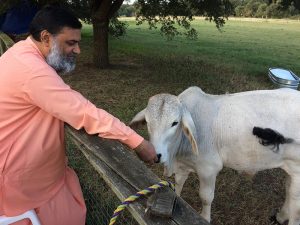 Interestingly, the male Kriyavans at the retreat contributed so much divine motherly love and support to this women’s ashram which is in its infancy. Twice as many men were present at this retreat than women. Male devotees did the dishes-after-meals seva every time. And the entire group of men at the guesthouse (and it was full) washed and dried all of their sheets and towels before they left at the end of the program. Surely all these considerate actions reflect the divine consciousness!
Interestingly, the male Kriyavans at the retreat contributed so much divine motherly love and support to this women’s ashram which is in its infancy. Twice as many men were present at this retreat than women. Male devotees did the dishes-after-meals seva every time. And the entire group of men at the guesthouse (and it was full) washed and dried all of their sheets and towels before they left at the end of the program. Surely all these considerate actions reflect the divine consciousness!
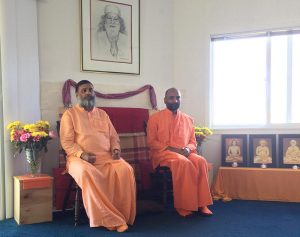 In addition to that, the seva week of preparations for the retreat had a low participation and had several cancellations so the main work was done by two male kriyavans. One stayed the entire week and the other stayed two days, driving four hours each way to come and do seva. Another Kriyavan baba devoted a day of selfless hard work constructing a temporary shelter for Karuna and Rishi. Yet another man donated much needed tools to the ashram. In addition, during the program, a group of men committed to putting the Meditation Dome together, resulting in a future seva weekend for that purpose. These men are role models to the world for giving loving support to efforts of change for women. It feels like the men are right there beside the women, offering supportive help the whole way.
In addition to that, the seva week of preparations for the retreat had a low participation and had several cancellations so the main work was done by two male kriyavans. One stayed the entire week and the other stayed two days, driving four hours each way to come and do seva. Another Kriyavan baba devoted a day of selfless hard work constructing a temporary shelter for Karuna and Rishi. Yet another man donated much needed tools to the ashram. In addition, during the program, a group of men committed to putting the Meditation Dome together, resulting in a future seva weekend for that purpose. These men are role models to the world for giving loving support to efforts of change for women. It feels like the men are right there beside the women, offering supportive help the whole way.
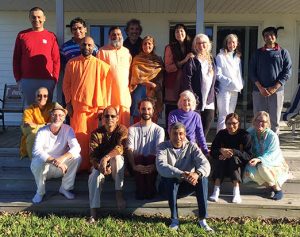
Of course the Divine Mother’s loving energy flowed through women also. One Indian mother gave her selfless service by preparing delicious food for everyone the entire program. Another devoted Kriyavan ma helped in the open-air, outdoor kitchen starting at 4 am every day and they worked until day’s end. Sevamayee Ma worked tirelessly, orchestrating meeting all the responsibilities of the ashram and program. And several women came to the ashram during seva week to help prepare for the program.
As Guruji Prajnanananda had instructed at the inauguration of the ashram, everyone–both men and women–worked to develop their compassionate nature and gave service at the Temple of Compassion.
It was an amazing weekend of renewal, of being steeped in the vibration of pure love and God consciousness, of being prepared to go back into the world and radiate love from our Soul under guidance of God and the lineage of Gurus, Swamis and Monks for support. What a Holy gift this Thanksgiving weekend brought!
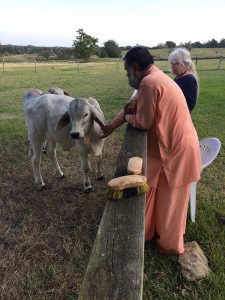
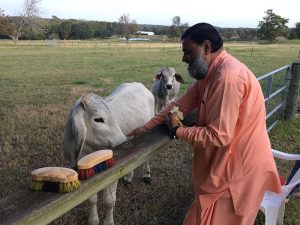
Article 4: Caring for Community
Postcard from Brahmachari Training by Erin Jay
Our newsletter’s first foreign correspondent Erin Jay shares insights from the 7th Annual Kriya Residential Brahmachari Training Course at Hariharananda Gurukulum in Balighai, Odisha, India.
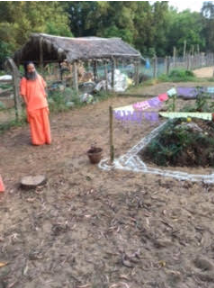
Guruji during “Go Navaratri” in Balighai, celebrating the first day of 9 days celebrating Cow as Divine Mother

Navaratri at Hariharananda Gurukulum
Postcard from Brahmachari Training
My Dearest Self,
God morning and Happy Holy-Days.
How is your mind today? Is it busy noticing all the ways we are different from each other? All the things that are different in the world? Is mind busy with “me and mine”? Guruji has been emphasizing the importance of truly experiencing Oneness in All. Not only in the people we encounter daily, but in all of creation – the whole global family, environment, and everything mind can conceptualize.
As Gurudev said, if we cannot see God in All we cannot see God at all. By discriminating we are denying God in All and God in ourselves as well.
Let’s work on experiencing Oneness and remembering we are all a part of God’s miraculous creation.
Love love love from Gurudev’s Gurukulum
Article 5: Let Your Compassion Bloom
One World Projects
The holiday season is upon us. It’s a time of good cheer, gathering with friends, forgiving differences, sharing food and drink, caroling, twinkling lights, gift giving and remembering those who are less fortunate than ourselves.
This holiday season we have an opportunity to help the less fortunate by purchasing our gifts through One World Projects. One World Projects’ focus is, and always has been, firmly on the welfare of artisans, their families and communities. Not only will 35% of each purchase go to the Temple of Compassion but a percentage of each sale will also help an artisan and their family in one of more than 25 developing countries across Latin America, Asia and Africa.
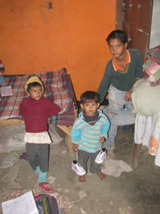 One family that OWP has helped is a story of two brothers. Rajeev and Umesh had been living in the streets near Delhi. Their days were spent hanging around railroad stations where they survived by stealing from pedestrians. One day they were caught by the police and sent to prison. In prison they received an education. While there, the brothers made a promise that when they were released they would start a business to rescue other children from the streets. They have rescued many children of all ages, providing them with housing, mentoring and education. When appropriate, they provide the older children with a skill set, such as sewing, that allows them to create an income for themselves and be productive in the community.
One family that OWP has helped is a story of two brothers. Rajeev and Umesh had been living in the streets near Delhi. Their days were spent hanging around railroad stations where they survived by stealing from pedestrians. One day they were caught by the police and sent to prison. In prison they received an education. While there, the brothers made a promise that when they were released they would start a business to rescue other children from the streets. They have rescued many children of all ages, providing them with housing, mentoring and education. When appropriate, they provide the older children with a skill set, such as sewing, that allows them to create an income for themselves and be productive in the community.
Lakshya, (meaning goal) is the organization started by the two brothers in 2004. It is a child and youth rehabilitation center located in a small village a few miles from Delhi. Rajeev and Umesh started by training a few village women in making newspaper bags. The village women grew from 8 to 150 over the years, and today make newspaper and other paper packaging bags which are supplied to several stores in India and can be purchased through One World Projects.
The brothers are also part of a larger youth rehabilitation group in New-Delhi. Many youth and children, who have either runaway from homes or orphaned are found at public places such as railway stations and bus stands. These locations are closely monitored. When these youth and children are brought to the shelter, the local police are informed. In some cases, parents or relatives are contacted and the children are sent back. In other cases they stay at the shelter. Some escape again, while some stay on. Currently, Lakshya supports a mixed group of 25 youth and children in the age group of 7-25 years.
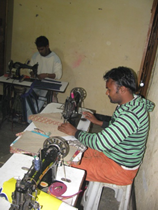 The younger children in the age group of 7-16 years are sent to local schools. Funds are limited, so the organization has not been able to send children for higher education. Instead, the youth learn several vocational skills which will help them to earn a living in the future. Five or six youth are trained in making patchwork shoulder bags, back packs, wallets and other accessories; including diary covers, belts, and handmade wooden pencils. Other vocational training includes administrative jobs, cooking & catering, auto mechanics, and more. Lakshya sells the handmade bags and other products made by these youth at the shelter through exhibitions and a few stores across India, as well as through One World Projects. The organization hopes to rescue and rehabilitate more children and youth who have run away from their homes, and is constantly trying to provide them with a more meaningful way to live.
The younger children in the age group of 7-16 years are sent to local schools. Funds are limited, so the organization has not been able to send children for higher education. Instead, the youth learn several vocational skills which will help them to earn a living in the future. Five or six youth are trained in making patchwork shoulder bags, back packs, wallets and other accessories; including diary covers, belts, and handmade wooden pencils. Other vocational training includes administrative jobs, cooking & catering, auto mechanics, and more. Lakshya sells the handmade bags and other products made by these youth at the shelter through exhibitions and a few stores across India, as well as through One World Projects. The organization hopes to rescue and rehabilitate more children and youth who have run away from their homes, and is constantly trying to provide them with a more meaningful way to live.
What started with the arrest of two brothers has blossomed into a compassionate organization dedicated to getting children off the streets and educating them. See and purchase some of the products made by Lakshya.
One World Projects has hope to help many people throughout the world. At Balashram in India, it hopes to help some of the children who will not be going on to trade school or college. Some of the ideas include helping Balashram graduates to set up their own businesses, by providing sewing machines, teaching them how to use them, sending a designer to work with them, and developing markets for their products all over the world.
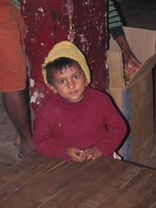 We are reminded of what Guruji has said:
We are reminded of what Guruji has said:
“Compassion requires that we emerge from our narrow shell and expand our love and empathy to those beyond our immediate circle.”
Let your compassion blossom this holiday season. Please consider doing all your holiday shopping through One World Projects. For more information and to make your purchase, follow this link: One World Projects or go to their website and enter KYITOC when the shopping cart asks for a Promotional Code or Coupon upon check out; either option will ensure that Temple of Compassion receives a donation that is equal to 35% of your purchase.
Some of the artisan stories and the projects that OWP is assisting with throughout the world will be highlighted in upcoming posts to the Temple of Compassion website. In addition, if you would like to receive a monthly newsletter about the artisans, the products that they produce, and updates about compassionate projects around the world that you can become involved with, please consider adding your name to the Compassionate Trade Newsletter.
